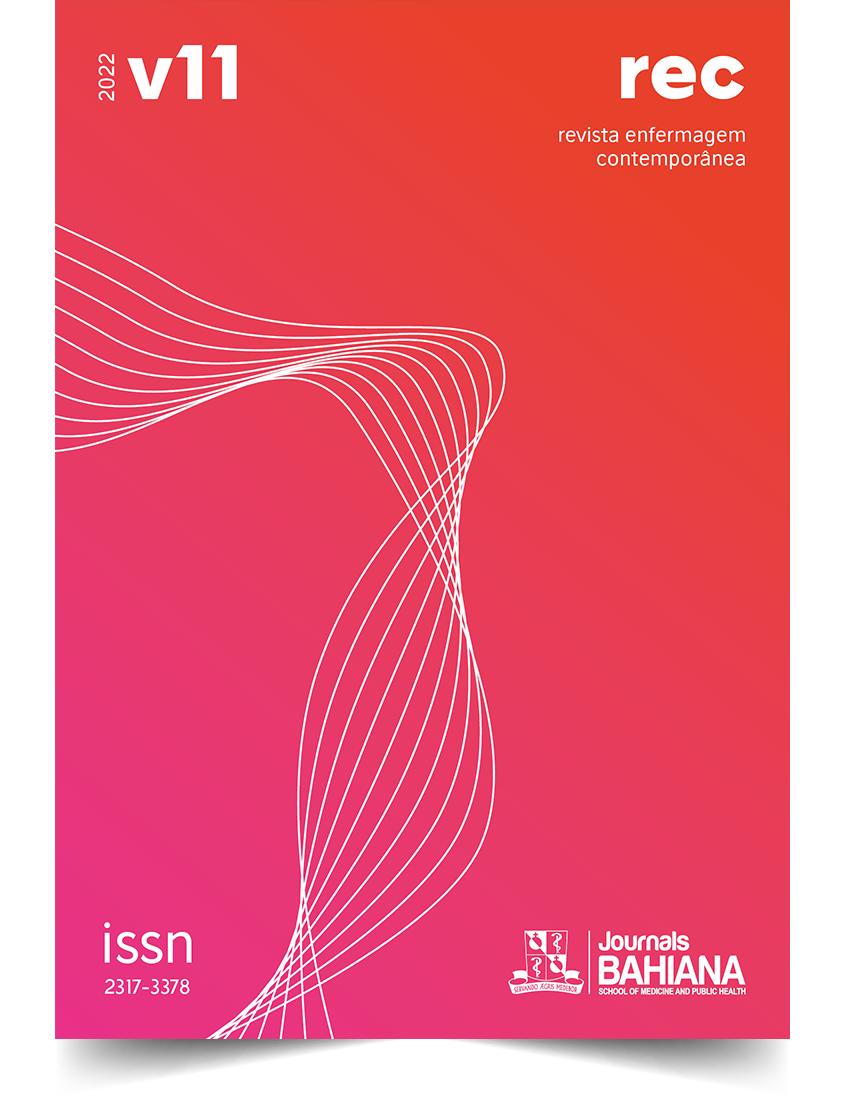Conhecimento das enfermeiras de um município baiano sobre as práticas integrativas e complementares em saúde
DOI:
https://doi.org/10.17267/2317-3378rec.2022.e4476Keywords:
Nursing, Integrative Practices, Primary CareAbstract
OBJECTIVES: To analyze the knowledge about Integrative and Complementary Practices in Health (PICS) on the part of Primary Care nurses in the city of Santo Estêvão - BA. METHODS AND MATERIALS: This is a field study, with a qualitative approach, with fifteen nurses from the Family Health Units of the aforementioned municipality. Data collection took place in two stages using a questionnaire and semi-structured interview. Descriptive analysis was used for the questionnaire data and content analysis for the interview data. RESULTS: The nurses in the municipality do not have training to work with PICS, as well as demonstrate little depth of knowledge of the practices and still reinforce biomedical arguments to justify them in the SUS. Despite this, they recognize the potential of PICS in complementary care and humanized care, and point out as challenges and impossibilities for the materialization of a municipal policy the gaps in specialized training and the absence of financial incentives. CONCLUSION: It is recognized the potential of nurses in the city of Santo Estêvão - BA, sensitized and mobilized for the process of discussion on the implementation of PICS as therapeutic resources that can expand the health care of the entire assisted community.
Downloads
References
(1) Telesi Júnior E. Práticas integrativas e complementares em saúde, uma nova eficácia para o SUS. Estudos avançados. 2016;30(86):99-112. https://doi.org/10.1590/S0103-40142016.00100007
(2) Habimorad PHL, Catarucci FM, Bruno VHT, Silva IB, Fernandes VC, Demarzo MMP, et al. Implementation of Brazil’s National Policy on Complementary and Integrative Practices: strengths and weaknesses. Ciência & Saúde Coletiva. 2020;25(2):395-405. https://doi.org/10.1590/1413-81232020252.11332018
(3) Ministério da Saúde (Brasil). Secretaria de Atenção Primária à Saúde [Internet]. Brasília: Ministério da Saúde; 2018. Available from: https://aps.saude.gov.br/biblioteca/visualizar/MTM0NQ
(4) Azevedo C, Moura CC, Corrêa HP, Mata LRF, Chaves ECL, Chianca TCM. Complementary and integrative therapies in the scope of nursing: legal aspects and academic-assistance panorama. Escola Anna Nery. 2019;23(02). https://doi.org/10.1590/2177-9465-EAN-2018-0389
(5) Minayo MCS. Amostragem e saturação em pesquisa qualitativa: consensos e controvérsias. Revista Pesquisa Qualitativa [Internet]. 2017;5(7)01-12. Available from: https://editora.sepq.org.br/rpq/article/view/82
(6) Minayo MCS, Deslandes SF, Cruz Neto O, Gomes R. Pesquisa Social: Teoria, método e criatividade [Internet]. Petrópolis: Vozes; 1994. Available from: https://wp.ufpel.edu.br/franciscovargas/files/2012/11/pesquisa-social.pdf
(7) Santiago MECF. Práticas Integrativas e Complementares: a Enfermagem Fortalecendo essa Proposta. Uniciências [Internet]. 2017;21(1):50-54. Available from: https://seer.pgsskroton.com/index.php/uniciencias/article/view/4646
(8) Nascimento MC, Romano VF, Chazan ACS, Quaresma CH. Professional education in complementary and alternative medicine: challenges for the public universities. Trab. Educ. Saúde. 2018;16(2):751-772. https://doi.org/10.1590/1981-7746-sol00130
(9) Tesser CD, Sousa IMC, Nascimento MC. Traditional and Complementary Medicine in Primary Health Care in Brazil. Saúde debate. 2018;42(1):174-188. https://doi.org/10.1590/0103-11042018S112
(10) Menezes APR, Moretti B, Reis AAC. The future of the SUS: impacts of neoliberal reforms on public health – austerity versus universality. Saúde debate. 2019;43(5):58-70. https://doi.org/10.1590/0103-11042019S505
(11) Ministério da Saúde (Brasil). Secretaria de Atenção Primária à Saúde [Internet]. Brasília: Ministério da Saúde. Available from: https://aps.saude.gov.br/smp/smpoquee
(12) Malta BCS, Malachias LB, Magalhães TA, Maia JS, Figueredo LP. Práticas integrativas e complementares e suas aplicabilidades nos campos de formação e atuação de enfermeiro. Revista PubSaúde. 2021;5(108). https://dx.doi.org/10.31533/pubsaude5.a108
(13) Mendes DS, Moraes FS, Lima GO, Silva PR, Cunha TA, Crossetti MGO, et al. Benefits of integrative and complementary practices in nursing care. Journal Health NPEPS. 2019;4(1):302-318. http://dx.doi.org/10.30681/252610103452
(14) Caires JS, Andrade TA, Amaral JB, Calasans MTA, Rocha MDS. A utilização das terapias complementares nos cuidados paliativos: benefícios e finalidades. Cogitare Enferm. 2014;19(3):514-520. http://dx.doi.org/10.5380/ce.v19i3.33861
Downloads
Published
Issue
Section
License
Copyright (c) 2022 Patrícia Serra dos Reis Rios, Amanda Leite Novaes, Iago Batista dos Santos, Maiane Almeida de Jesus Ribeiro, Viviana Graziela de Almeida Vasconcelos Barboni

This work is licensed under a Creative Commons Attribution 4.0 International License.
This work is licensed under a Creative Commons Attribution 4.0 International License.



